
Applications, or the vast selection of them, are easily what make smartphones and tablets "smarter." They come in all shapes and sizes, and bring (most of) the capability of a home computer to your pocket-sized companion. Chances are, if you have an Android or iOS device (or even a BlackBerry or Windows Phone), you stock your phone (or tablet) with mountains of applications – games, utility, social, news, weather apps and more.
Apps come in two basic flavors (four, really): premium and free. With premium apps, you typically pay the developer once and can re-download the app as much as you'd like. Free apps can be broken into three categories, but are usually ad-supported. Instead of a one-time fee, the developer gets paid a residual income based on click-throughs, much like how 90 percent of the Internet works. The other two, which are much less common are totally free (no ads, no price to the end user) and subscription. The app itself is generally free for subscriptions, but the services within are paid – like rdio, Spotify or Zinio.
Unsurprisingly, I buy a lot of premium applications. I've spent somewhere near $120 in Android applications alone. Yikes! (Don't even get me started on iOS.) Much like I believe manufacturers should be compensated for their hard work and impressive hardware feats, developers of mobile apps, should be paid for their efforts, too. After all, smartphones wouldn't be all that fun or capable without them. That said, there are some applications out there that are way overpriced or not worth the money spent.
The problem is, you usually don't realize this until after you've clicked "Purchase." I cannot begin to tell you how many applications I have bought and wish I could have returned.
Anyone who has purchased a premium application from Android Market should know that there is a 15-minute return window. It begins from the time the application finishes installing. It's only good for one return. This makes testing an app out a little easier, but even 15 minutes isn't always enough to get a feel for an app and explore all nooks and crannies.
Just Tuesday, I pulled the trigger on a game I've been contemplating for a few weeks now. I tend to put too much thought into buying a measly $7 game or app, especially when I'm so quick to buy a new console game for $60. But if you don't like a non-digital purchase, you can simply trek back to the store and return it or trade it in. After several recommendations, though, I decided to purchase 9MM, a sandbox, GTA-style game for Android devices.
Being a 1.3MB download from Android Market, the download and install finished within a minute. But I knew there was more. Upon opening the app for the first time, I was prompted with a message telling me I would need to download an additional 870MB to finish the installation. Mind you, this is post-Android Market; this is cutting into the 15-minute return period. 12 minutes later, the download finished and the app restarted. I was then prompted to download an additional 4MB. I did. The app restarted again and quickly force closed. I tried again, rebooted the tablet ... tried again. Nothing. Aggravated, I decided to return it last minute. I went back to the Android Market page, clicked "Refund" which was promptly replaced with "Uninstall." The app was mine. Forever. Now I have a $7 app that doesn't work on any device I own. (Note: Google provided a way around this months ago; they upped the maximum application size to 4GB from 50MB. But developers, especially game developers, still have yet to adopt it.) It's frustrating, to say the least.
The biggest problem here is with iOS. There is no way to test out a premium application. No return period. You either buy it and like it, or cut your losses and move on, and that's that.
Of course, there are always "lite" versions of apps that you can download for free and get a preview of the full version. But "lite" versions are just as the name implies, lightweight. Most of the features you want to test are left out or very limited, meaning downloading a lite version is sometimes more trouble than it's worth.
Personally, I feel that every mobile application store should offer a return window. And kudos to Google for doing that. But for those of you who remember, Google used to offer a 24 hour return period. They had to cut this down to avert the growing problem with piracy, but 15 minutes simply is not enough, especially for games that require an additional 500MB or more after the initial installation completes and the ticker starts ticking. A bare minimum of a 30-minute or one hour return window should be mandatory for all applications in every app store. Every. Last. One.
What about you, pups? Have you ever bought an application and regretted it? Has the 15-minute return period from Android Market not been long enough to complete the installation of an app you wanted to try? Should all stores have a significant and reasonable return period?